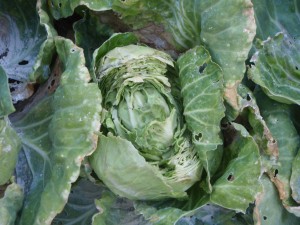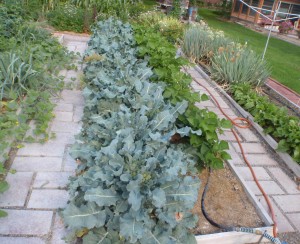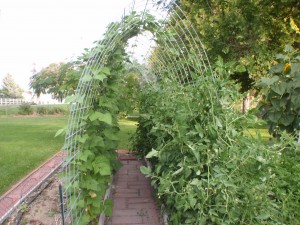When you plant your garden in the spring, you have visions baskets of fresh veggies. The weather is cool and pleasant. The weeds are cute in their newborn stage, just another sign of life in the soil. You are delighting in being outside because you are recovering from winter cabin fever.

By August, there are about 3 hours before 9 AM when the temperatures aren’t roasting. Wasps swarm around when you turn the water on. You have welts on your body that might be from stealth spiders in the underbrush. Some of your darling plants look like mutant jungle weeds, while others are being eaten by horse riding insects from Mongolia. It can be tempting to go inside the house and stay until October, or the first killing frost. Or maybe you opt for a prison camp mentality of 18 hours of forced labor a day. (click on any photo to enlarge)

There are other, more rewarding strategies, though. You need to take charge of your garden instead of letting your garden propel you into a state of late summer psychosis. This doesn’t mean you whip yourself up into a superhero frenzy, but rather that you take steps to continue to enjoy your garden as it fits with the realities of your current life.
First, figure out about how much time you reeaaally have to work with your garden. Break it down to weekly, daily, and hourly estimates. Make a pact with yourself that you won’t get stressed out because you don’t “have more time.”

Next, think about the potential garden goals. Decide what is most important to you (and others impacted by your decision) Do you need to just forget about the weeds, because it is most important to preserve as much garden abundance as you can? Or does a neat, picturesque garden meet your needs best at the end of the day? Then, again, maybe what you need to focus on is just harvesting whatever is ripe and cooking it up on a daily basis.

Once you decide on your main emphasis, you can still work on the other aspects of gardening a little, as your mood or schedule suit you, but it will just be sunshine on your shoulders. Instead of being overwhelmed by everything, you’ll be able to give yourself “extra credit” and come away happy. Being happy tends to make a body more energetic, so you’ll probably find that you end up getting more done than you were before. Hey, maybe you DO have a super power! Happiness!


So, the trick to maintaining garden gusto in the face of August challenges is to choose what to be gusto about. Spend more time thinking about what has been accomplished than what didn’t get done. You can still explore ways to be more efficient, in general, but don’t let a supposedly imperfect garden rob you of enjoying what you have.
Take photos of the spots that could be in a magazine to capture the joy of why you started the whole process. Learn from the non-photogenic areas, and maybe adjust your plans for next spring. But keep in mind that the perfect garden is one that is growing. If you have anything growing and producing those fresh veggies, you have succeeded.

